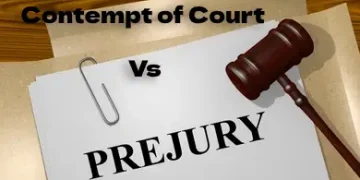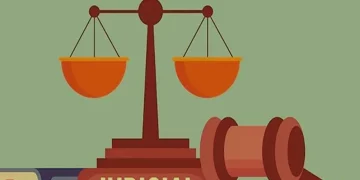What is the procedure to get anticipatory bail in the 498a case?
OR
How to get anticipatory bail in the 498a case?
After FIR was registered in a 498a case, obtaining anticipatory bail is vital for those named in the complaint. Section 438 of the Criminal Procedure Code (Cr.P.C.) governs this process, allowing individuals to file for anticipatory bail either in the Session Court or the High Court. It’s advisable to begin with the Session Court and, if needed, appeal to the High Court if the initial plea is rejected.
Filing directly in the High Court is discouraged, as it generally redirects petitioners to the Session Court first. The Session Court can not only grant anticipatory bail but also issue a pre-arrest notice, usually 7 or 5 days, both before and after FIR registration. This notice serves as a buffer, giving individuals a chance to approach the court for anticipatory bail again, thereby avoiding sudden arrests. This strategic approach helps navigate the legal system effectively in 498a cases.
IS 498A BAILABLE OR NON-BAILABLE?
An offense under Section 498A of the Indian Penal Code (IPC) is deemed cognizable, non-compoundable, and non-bailable. This signifies that, upon receipt of a complaint from an aggrieved woman or her family members, the police are mandated to initiate an FIR against the accused parties. Due to its non-bailable nature, the police are empowered to apprehend the accused individuals. In such instances, the sole recourse available to the accused is to petition for anticipatory bail from the competent court under Section 438 of the Criminal Procedure Code (Cr.P.C.). Anticipatory bail serves as a critical legal remedy, enabling individuals accused under Section 498A IPC to proactively secure protection against arrest during the ongoing investigation.
DECISIONS BY THE SUPREME COURT THAT HAVE CONTROLLED UNLAWFUL ARRESTS IN 498A CASES:
ARNESH KUMAR V. STATE OF BIHAR AND ANOTHER (2014) 8 SCC 273
The Supreme Court, noting that the offense under Section 498A IPC is both cognizable and non-bailable, has remarked on its contentious position as a provision often wielded as a weapon rather than a shield by dissatisfied wives. It has been observed that this provision is susceptible to misuse, with the easiest means of harassment being the arrest of the husband and his relatives under its ambit.
The Court has acknowledged the data presented in the “Crime in India 2012 Statistics” by the National Crime Records Bureau, Ministry of Home Affairs, revealing a total of 1,97,762 arrests across India in 2012 under Section 498-A. Expressing concern, the Court asserted that arrests result in humiliation, restrict freedom, and leave lasting scars. Furthermore, the Court highlighted that the police seemed to have overlooked the implicit lessons embodied in the Criminal Procedure Code.
Commenting on the police, the Court said:- “It has not come out of its colonial image despite six decades of Independence, it is largely considered as a tool of harassment, oppression and surely not considered a friend of the public. The need for caution in exercising the drastic power of arrest has been emphasized time and again by the courts but has not yielded the desired result. Power to arrest greatly contributes to its arrogance so also the failure of the Magistracy to check it. Not only this, the power of arrest is one of the lucrative sources of police corruption. The attitude to arrest first and then proceed with the rest is despicable. It has become a handy tool for police officers who lack sensitivity or act with oblique motives.
The Court, thereafter, has distinguished between the power to arrest and justification for the exercise of it and analyzed Section 41 CrPC.
From a plain reading of the aforesaid provision, it is evident that a person accused of an offense punishable with imprisonment for a term which may be less than seven years or which may extend to seven years with or without fine, cannot be arrested by the police officer only on his satisfaction that such person had committed the offense punishable as aforesaid. A police officer before the arrest, in such cases, has to be further satisfied that
- Such arrest is necessary to prevent such a person from committing any further offense; for proper investigation of the case; or
- To prevent the accused from causing the evidence of the offense to disappear, or tampering with such evidence in any manner; or
- To prevent such a person from making any inducement, threat, or promise to a witness to dissuade him from disclosing such facts to the court the police officer; or
- Unless such an accused person is arrested, his presence in the court whenever required cannot be ensured.
These are the conclusions, that one may reach based on facts. In pith and core, the police officer before arrest must question himself, why arrest? Is it required? What purpose it will serve? What object it will achieve? It is only after these questions are addressed and one or the other conditions as enumerated above are satisfied, the power of arrest needs to be exercised.
In fine, before arrest first, the police officers should have reason to believe based on information and material that the accused has committed the offence. Apart from this, the police officer has to be satisfied further that the arrest is necessary for one or the more purposes envisaged by sub-clauses (a) to (e) of clause (1) of Section 41 CrPC.”
The learned Judges, thereafter, referred to Section 41-A CrPC which has been inserted by Section 6 of the Code of Criminal Procedure (Amendment) Act, 2008 (5 of 2009). The said provision is to the following effect:-
The directions issued in the said case are worthy to note:-
Our Endeavour in this judgment is to ensure that police officers do not arrest the accused unnecessarily and Magistrate does not authorize detention casually and mechanically. To ensure what we have observed above, we give the following directions:
11.1. All the State Governments to instruct their police officers not to automatically arrest when a case under Section 498-A IPC is registered but to satisfy themselves about the necessity for arrest under the parameters laid down above flowing from Section 41 CrPC;
11.2. All police officers are provided with a checklist containing specified sub-clauses under Section 41(1)(b)(ii);
11.3. The police officer shall forward the checklist duly filed and furnish the reasons and materials that necessitated the arrest while forwarding/producing the accused before the Magistrate for further detention;
11.4. The Magistrate while authorizing detention of the accused shall peruse the report furnished by the police officer in terms aforesaid and only after recording its satisfaction, the Magistrate will authorize detention;
11.5. The decision not to arrest an accused, be forwarded to the Magistrate within two weeks from the date of the institution of the case with a copy to the Magistrate which may be extended by the Superintendent of Police of the district for the reasons to be recorded in writing;
11.6. Notice of appearance in terms of Section 41-A CrPC be served on the accused within two weeks from the date of institution of the case, which may be extended by the Superintendent of Police of the district for the reasons to be recorded in writing;
11.7. Failure to comply with the directions aforesaid shall apart from rendering the police officers concerned liable for departmental action, shall also be liable to be punished for contempt of court to be instituted before the High Court having territorial jurisdiction.
11.8. Authorizing detention without recording reasons as aforesaid by the Judicial Magistrate concerned shall be liable for departmental action by the appropriate High Court.
GUIDELINES ISSUED BY THE SUPREME COURT IN THE CASE OF
“RAJESH SHARMA AND ORS V. STATE OF U.P. AND ANR. AIR 2017 SC 3869: 2017 (8) SCALE 313”
The Supreme Court in the case of Rajesh Sharma (supra) issued the following guidelines to prevent misuse of sec. 498A IPC:-
i) (a) In every district one or more Family Welfare Committees be constituted by the District Legal Services Authorities preferably comprising of three members. The constitution and working of such committees may be reviewed from time to time and at least once a year by the District and Sessions Judge of the district who is also the Chairman of the District Legal Services Authority.
(b) The Committees may be constituted out of para legal volunteers/social workers/retired persons/ wives of working officers/other citizens who may be found suitable and willing.
(c) The Committee members will not be called as witnesses.
(d) Every complaint under Section 498A received by the police or the Magistrate be referred to and looked into by such committee. Such committee may have interaction with the parties personally or using telephone or any other mode of communication including electronic communication.
(e) Report of such committee is given to the Authority by whom the complaint is referred to at latest within one month from the date of receipt of the complaint.
(f) The committee may give its brief report about the factual aspects and its opinion on the matter.
(g) Till the report of the committee is received, no arrest should normally be effected.
(h) The report may be then considered by the Investigating Officer or the Magistrate on its own merit.
(i) Members of the committee may be given such basic minimum training as may be considered necessary by the Legal Services Authority from time to time.
(j) The Members of the committee may be given such honorarium as may be considered viable.
(k) It will be open to the District and Sessions Judge to utilize the cost fund wherever considered necessary and proper.
ii) Complaints under Section 498A and other connected offences may be investigated only by a designated Investigating Officer of the area. Such designations may be made within one month from today. Such designated officers may be required to undergo training for such duration (not less than one week) as may be considered appropriate. The training may be completed within four months from today;
iii) In cases where a settlement is reached, it will be open to the District and Sessions Judge or any other senior Judicial Officer nominated by him in the district to dispose of the proceedings including closing of the criminal case if dispute primarily relates to matrimonial discord.
iv) If a bail application is filed with at least one clear day’s notice to the Public Prosecutor/complainant, the same may be decided as far as possible on the same day. Recovery of disputed dowry items may not by itself be a ground for denial of bail if maintenance or other rights of wife/minor children can otherwise be protected. Needless to say that in dealing with bail matters, individual roles, prima facie truth of the allegations, the requirement of further arrest/ custody and interest of justice must be carefully weighed;
v) In respect of persons ordinarily residing out of India impounding of passports or issuance of Red Corner Notice should not be a routine;
vi) It will be open to the District Judge or a designated senior judicial officer nominated by the District Judge to club all connected cases between the parties arising out of matrimonial disputes so that a holistic view is taken by the Court to whom all such cases are entrusted, and
vii) Personal appearance of all family members and particularly outstation members may not be required and the trial court ought to grant exemption from personal appearance or permit the appearance by video conferencing without adversely affecting the progress of the trial.
viii) These directions will not apply to the offences involving tangible physical injuries or death.
DIRECTION OF THE SUPREME COURT IN THE CASE OF
“SOCIAL ACTION FORUM FOR MANAV ADHIKAR AND ANOTHER VS UNION OF INDIA MINISTRY OF LAW AND JUSTICE AND OTHERS W.P(C) NO.73 OF 2015”
A writ petition has been filed by Social Action Forum for Manav Adhikar and another Vs Union of India Ministry of Law and Justice and others W.P(C) NO.73 of 2015 and finally the Supreme Court passed the judgment thereby certain directions issued in the case of Rajesh Sharma and Ors V. State of U.P. and Anr. AIR 2017 SC 3869: 2017 (8) SCALE 313 has been overruled. The operating part of the judgments is as under:-
In the aforesaid analysis, while declaring the directions pertaining to Family Welfare Committee and its constitution by the District Legal Services Authority and the power conferred on the Committee is impermissible.
Therefore, we think it appropriate to direct that the investigating officers be careful and be guided by the principles stated in Joginder Kumar (supra), D.K. Basu (supra), Lalita Kumari (supra), and Arnesh Kumar (supra).
It will also be appropriate to direct the Director-General of Police of each State to ensure that investigating officers who are in charge of the investigation of cases of offences under Section 498-A IPC should be imparted rigorous training concerning the principles stated by this Court relating to arrest.
Given the aforesaid premises, the direction contained in paragraph 19(i) as a whole is not in accord with the statutory framework and the direction issued in paragraph 19(ii) shall be read in conjunction with the direction given hereinabove. . Direction No. 19(iii) is modified to the extent that if a settlement is arrived at, the parties can approach the High Court under Section 482 of the Code of Criminal Procedure and the High Court, keeping in view the law laid down in Gian Singh (supra), shall dispose of the same.
As far as direction Nos. 19(iv), 19(v) and 19(vi) and 19(vii) are concerned, they shall be governed by what we have stated in paragraph 35. 35 42. With the aforesaid modifications in the directions issued in Rajesh Sharma (supra), the writ petitions and criminal appeal stand disposed of.
It can be asserted that, thanks to the honorable interventions of the Supreme Court, the abuse of Section 498A IPC has been curtailed to a certain degree. Additionally, the Court has prohibited unlawful arrests in cases associated with Section 498A IPC and false dowry demands.

















